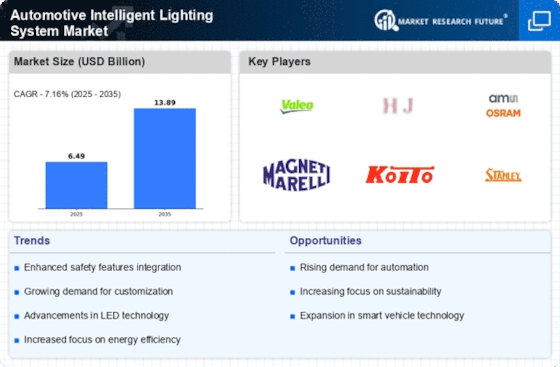Top Industry Leaders in the Automotive Intelligent Lighting System Market

*Disclaimer: List of key companies in no particular order
Top listed companies in the Automotive Intelligent Lighting System industry are:
Hella KGaA Hueck & Co. (Germany)
Magneti Marelli S.p.A. (Italy)
Osram Continental GmbH (Germany)
ELBA SA (Romania)
Teknoware Oy (Finland)
KOITO MANUFACTURING CO. LTD. (Japan)
Grupo Antolin (Spain)
HYUNDAI MOBIS (Korea)
ICHIKOH INDUSTRIES LTD. (Japan)
STANLEY ELECTRIC CO LTD. (Japan).
Key Player Strategies:
Technological Prowess: Major players like Valeo, Hella, and Koito are heavily investing in R&D, focusing on advanced technologies like adaptive headlights, laser lighting, and OLED displays integrated into headlights. These innovations not only enhance safety and visibility but also cater to the growing demand for aesthetic appeal.
Strategic Partnerships: Collaboration is key in a rapidly evolving landscape. Tier 1 suppliers like Bosch and Continental are partnering with technology giants like Google and Apple to integrate connected car features into intelligent lighting systems, paving the way for autonomous driving advancements.
Regional Focus: Market penetration strategies vary geographically. European players like Osram and Philips emphasize safety regulations and premium car segments, while Asian giants like LG and Stanley Electric cater to the mass market with cost-effective solutions.
Sustainability Push: Environmental consciousness is driving players to develop energy-efficient LED lighting systems and explore renewable energy sources like solar cells for powering headlights. Sustainability-focused companies like Cree and OSRAM Continental are attracting both eco-conscious consumers and regulatory tailwinds.
Factors for Market Share Analysis:
Product Portfolio Breadth: Offering a diverse range of intelligent lighting systems catering to different vehicle segments and price points is crucial. Players like Magneti Marelli and HELLA with comprehensive portfolios are well-positioned to capture market share.
Geographical Presence: Global reach and strong distribution networks are critical for success. Established players like Hella and Valeo benefit from their extensive regional presence, while emerging players like Aptiv are aggressively expanding overseas to challenge the status quo.
Branding and Reputation: Building a strong brand image associated with innovation and quality is essential. Tier 1 suppliers like Continental and Bosch leverage their established reputations to gain an edge, while newer players like Luminar are investing heavily in brand awareness campaigns.
Cost Competitiveness: Balancing advanced technology with affordability is key to winning over price-sensitive consumers. Asian players like Stanley Electric and Koito excel in delivering cost-effective solutions, while European players like Hella target premium segments with feature-rich systems.
New and Emerging Trends:
Personalization: Lighting systems that adapt to driver preferences and adjust to road conditions in real-time are gaining traction. Companies like Philips and Valeo are developing systems that personalize light patterns and brightness for individual drivers.
V2X Communication: Integration with vehicle-to-everything (V2X) technology allows intelligent lighting systems to communicate with surrounding infrastructure and vehicles, enabling safer and more efficient driving. Players like Bosch and Continental are at the forefront of this development.
Health and Wellness: Lighting systems with therapeutic benefits like reducing driver fatigue and improving alertness are being explored. Companies like Osram and HELLA are partnering with research institutions to develop such systems.
Cybersecurity: As intelligent lighting systems become more sophisticated, so do the cybersecurity risks. Companies like Aptiv and Luminar are prioritizing robust cybersecurity measures to protect against hacking and data breaches.
Overall Competitive Scenario:
The automotive intelligent lighting system market is characterized by fierce competition, with established players vying for dominance alongside innovative startups. Technological advancements, regional expansion strategies, and sustainability initiatives are key differentiators. Companies that successfully navigate these trends and address evolving consumer demands will illuminate their path to market leadership. While established players leverage their extensive experience and brand recognition, startups hold the potential to disrupt the market with niche solutions and agile development cycles. The race for automotive lighting supremacy is well underway, and it will be fascinating to witness how this dynamic landscape evolves in the years to come.
Latest Company Updates:
Hella KGaA Hueck & Co. (Germany): July 2023: Unveiled new full-LED adaptive headlight module with matrix function and dynamic cornering lights
Magneti Marelli S.p.A. (Italy): December 2023: Showcased advanced ambient lighting system with dynamic personalization options at CES 2024
Osram Continental GmbH (Germany): November 2023: Launched high-resolution micro-LED headlamp technology with personalized beam patterns
Teknoware Oy (Finland): December 2023: Unveiled innovative headlight technology with integrated LiDAR sensor for enhanced ADAS functionality










